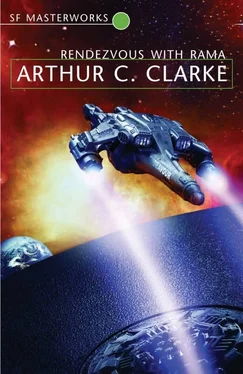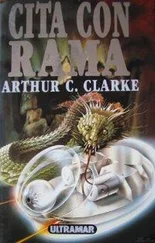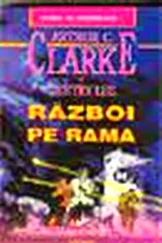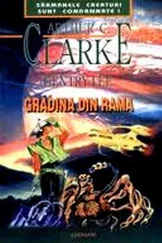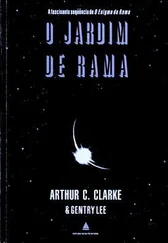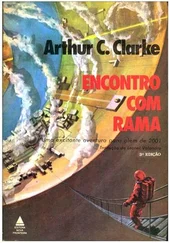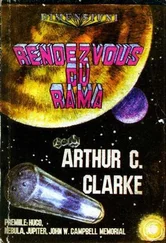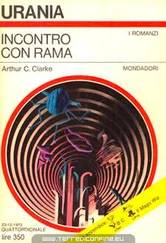“Bridge,” he called, “did you notice that?”
“Yes, Skipper—very small shock. Could be another attitude change. We’re watching the rate gyro—nothing yet. Just a minute! Positive reading! Can just detect it—less than a microradian per second, but holding.”
So Rama was beginning to turn, though with almost imperceptible slowness. Those earlier shocks might have been a false alarm but this, surely, was the real thing.
“Rate increasing five microrad. Hello, did you feel that shock?”
“We certainly did. Get all the ship’s systems operational. We may have to leave in a hurry.”
“Do you expect an orbit change already? We’re still a long way from perihelion.”
“I don’t think Rama works by our textbooks. Nearly at Beta. We’ll rest there for five minutes.”
Five minutes was utterly inadequate, yet it seemed an age. For there was now no doubt that the light was failing, and failing fast.
Though they were all equipped with flashlights, the thought of darkness here was now intolerable; they had grown so psychologically accustomed to the endless day that it was hard to remember the conditions under which they had first explored this world. They felt an overwhelming urge to escape—to get out into the light of the Sun, a kilometre away on the other side of these cylindrical walls.
“Hub Control!” called Norton. “Is the searchlight operating? We may need it in a hurry.”
“Yes, Skipper. Here it comes.”
A reassuring spark of light started to shine eight kilometres above their heads. Even against the now fading day of Rama, it looked surprisingly feeble; but it had served them before, and would guide them once again if they needed it.
This, Norton was grimly aware, would be the longest and most nerve-wracking climb they had ever done. Whatever happened, it would be impossible to hurry; if they overexerted themselves, they would simply collapse somewhere on that vertiginous slope, and would have to wait until their protesting muscles permitted them to continue. By this time, they must be one of the fittest crews that had ever carried out a space mission; but there were limits to what flesh and blood could do.
After an hour’s steady plodding they had reached the fourth section of the stairway, about three kilometres from the plain. From now on, it would be much easier; gravity was already down to a third of Earth value. Although there had been minor shocks from time to time, no other unusual phenomena had occurred, and there was still plenty of light. They began to feel more optimistic, and even to wonder if they had left too soon. One thing was certain, however; there was no going back. They had all walked for the last time on the plain of Rama.
It was while they were taking a ten-minute rest on the fourth platform that Joe Calvert suddenly exclaimed: “What’s that noise, Skipper?”
“Noise! I don’t hear anything.”
“High-pitched whistle—dropping in frequency, you must hear it.”
“Your ears are younger than mine—oh, now I do.”
The whistle seemed to come from everywhere. Soon it was loud, even piercing, and falling swiftly in pitch. Then it suddenly stopped.
A few seconds later it came again, repeating the same sequence. It had all the mournful, compelling quality of a lighthouse siren sending out its warnings into the fog-shrouded night. There was a message here, and an urgent one. It was not designed for their ears, but they understood it. Then, as if to make doubly sure, it was reinforced by the lights themselves.
They dimmed almost to extinction, then started to flash. Brilliant beads, like ball lightning, raced along the six narrow valleys that had once illuminated this world. They moved from both Poles towards the Sea in a synchronized, hypnotic rhythm which could have only one meaning. “To the Sea!” the lights were calling, “To the Sea!” And the summons was hard to resist; there was not a man who did not feel a compulsion to turn back, and to seek oblivion in the water of Rama.
“Hub Control!” Norton called urgently. “Can you see what’s happening?”
The voice of Pieter came back to him; he sounded awed, and more than a little frightened.
“Yes, Skipper. I’m looking across at the Southern continent. There are still scores of biots over there—including some big ones. Cranes; Bulldozers—lots of Scavengers. And they’re all rushing back to the Sea faster than I’ve ever seen them move before. There goes a Crane—right over the edge! Just like Jimmy, but going down a lot quicker… it smashed to pieces when it hit… and here come the Sharks—they’re tearing into it… ugh; it’s not a pleasant sight…”
“Now I’m looking at the plain. Here’s a Bulldozer that seems to have broken down… it’s going round and round in circles. Now a couple of Crabs are tearing into it, pulling it to pieces… Skipper, I think you’d better get back right away.”
“Believe me,” Norton said with deep feeling, “we’re coming just as quickly as we can.”
Rama was battening down the hatches, like a ship preparing for a storm. That was Norton’s overwhelming impression, though he could not have put it on a logical basis. He no longer felt completely rational; two compulsions were warring in his mind—the need to escape, and the desire to obey those bolts of lightning, that still flashed across the sky, ordering him to join the biots in their march to the sea.
One more section of stairway—another ten-minute pause, to let the fatigue poisons drain from his muscles. Then on again—another two kilometres to go, but let’s try not to think about that. The maddening sequence of descending whistles abruptly ceased. At the same moment, the fireballs racing along the slots of the Straight Valleys stopped their seaward strobing; Rama’s six linear suns were once more continuous bands of light.
But they were fading fast, and sometimes they flickered, as if tremendous jolts of energy were being drained from waning power sources. From time to time, there were slight tremors underfoot; the bridge reported that Rama was still swinging with imperceptible slowness, like a compass needle responding to a weak magnetic field. This was perhaps reassuring; it was when Rama stopped its swing that Norton would really begin to worry.
All the biots had gone, so Pieter reported. In the whole interior of Rama, the only movement was that of human beings, crawling with painful slowness up the curving face of the north dome.
Norton had long since overcome the vertigo he had felt on that first ascent, but now a new fear was beginning to creep into his mind. They were so vulnerable here, on this endless climb from plain to Hub. Suppose that, when it had completed its attitude change, Rama started to accelerate?
Presumably its thrust would be along the axis. If it was in the northward direction, that would be no problem; they would be held a little more firmly against the slope which they were ascending. But if it was towards the south, they might be swept off into space, to fall back eventually on the plain far below.
He tried to reassure himself with the thought that any possible acceleration would be very feeble. Dr. Perera’s calculations had been most convincing; Rama could not possibly accelerate at more than a fiftieth of a gravity, or the Cylindrical Sea would climb the southern cliff and flood an entire continent. But Perera had been in a comfortable study back on Earth, not with kilometres of overhanging metal apparently about to crash down upon his head. And perhaps Rama was designed for periodic flooding—
No, that was ridiculous. It was absurd to imagine that all these trillions of tons could suddenly start moving with sufficient acceleration to shake him loose. Nevertheless, for all the remainder of the ascent, Norton never let himself get far from the security of the handrail. Lifetimes later, the stairway ended; only a few hundred metres of vertical, recessed ladder were left. It was no longer necessary to climb this section since one man at the Hub, hauling on a cable, could easily hoist another against the rapidly diminishing gravity. Even at the bottom of the ladder a man weighed less than five kilos; at the top, practically zero. So Norton relaxed in the sling, grasping a rung from time to time to counter the feeble Coriolis force still trying to push him off the ladder. He almost forgot his knotted muscles, as he had his last view of Rama. It was about as bright now as a full moon on Earth; the overall scene was perfectly clear, but he could no longer make out the finer details. The South Pole was now partially obscured by a glowing mist; only the peak of Big Horn protruded through it—a small, black dot, seen exactly head-on.
Читать дальше
